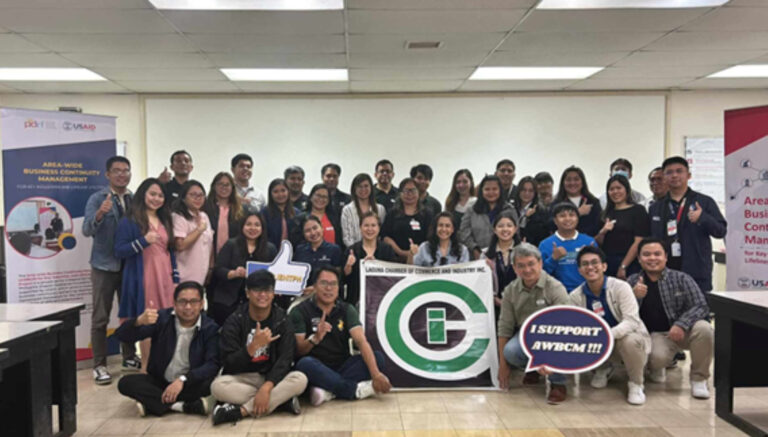The Laguna Chamber of Commerce and Industry (LCCI) made history for the second consecutive year at the 51st Philippine Business Conference and Expo last October 2025. LCCI captured not one but two Most Outstanding Chamber Awards: the national-level Most Outstanding Chamber in the Philippines and the regional Most Outstanding Chamber in South Luzon, both in the province level, small chamber category.
This remarkable achievement marks LCCI’s back-to-back sweep of these prestigious honors, having won the same dual recognition in 2024. For a provincial chamber to dominate the national stage two years running represents an unprecedented feat in Philippine business chamber history — a testament to sustained excellence, strategic vision and collaborative execution.
The timing carries special significance. As LCCI commemorates its 50th anniversary — having been founded in 1975 — these consecutive victories affirm five decades of service while showcasing a bold transformation under the historic leadership of Rose Lynn Zara-Coloma, the chamber’s first female president and the first female executive committee member from Asian Transmission Corp.
The foundation of excellence: Three strategic pillars
LCCI’s award-winning approach centers on three interconnected initiatives that have fundamentally strengthened Laguna’s economic ecosystem. What distinguishes these projects isn’t merely their scope, but the depth of collaboration required to execute them — bringing together chamber officers, members, government agencies and private partners in unprecedented coordination.
“Our success is grounded in strong collaboration, programs and committed leadership. We actively engage our members, work closely with government and industry partners, and deliver initiatives that support employment, labor harmony, MSME growth, and economic and disaster resiliency. These awards reflect shared effort and dedication to Laguna’s business community,” Zara-Coloma shared.
The cornerstone of LCCI’s success is the Area-Wide Business Continuity Plan or BCP, a prototype initiative that emerged from realistic assessments of the vulnerabilities facing the Science Park of the Philippines, Inc. located in Cabuyao, Laguna. The province’s manufacturing centers and business districts face persistent threats: from typhoons and earthquakes and the Taal Volcano eruption to supply chain disruptions that cascade across the local economy.
Rather than simply recommending preparedness measures, LCCI’s team forged a strategic partnership with the Provincial Government of Laguna and the Philippine Disaster Resilience Foundation. This wasn’t just a memorandum of understanding; it was an institutionalized commitment to provide free monthly training sessions until May 2025, which was unfortunately abruptly cut on February 2025, due to political shifts in the United States. Chamber officers brought specialized expertise in logistics, risk management, and regulatory compliance to create a framework that is both comprehensive and accessible. The result transcends traditional emergency response planning — it’s an interconnected safety net where industries can support each other’s recovery and continuity.
“We built an interconnected, provincial safety net, ensuring that when one industry goes down, the rest can immediately step in to help it recover. That resilience is a shared success,” Zara-Coloma explains. The model has proven so effective that it has attracted national attention, demonstrating how coordinated private-public partnerships can protect regional economies from cascading failures. Member-companies have directly empowered managers, safety officers and key supervisors participating in the free training sessions that have enhanced their organizational resilience.
Empowering the economic foundation: MSME development
LCCI’s leadership recognized a fundamental truth that many chambers overlook: the health of large industries depends entirely on a robust network of micro, small, and medium enterprises (MSMEs). Rather than treating MSME development as a separate program, the chamber integrated it into their core strategic vision.
“We are proud to have contributed to Laguna’s GDP and rise as a leading industrial and investment hub. Key milestones include strengthening labor-management cooperation and industrial peace, promoting disaster and business resilience and sustainability, supporting MSMEs, building workforce capabilities, and fostering partnerships with government and the private sector,” Zara-Coloma mentioned, stressing that Chamber officers organized targeted workshops on digital transformation, recognizing that technological adoption is critical for MSMEs to remain competitive in modern markets.
The result was an ambitious three-way partnership among LCCI, the Laguna Local Economic Development and Investment & Promotion Officer or Ledipo, and the Department of Trade and Industry (DTI). Aligning three separate organizational mandates — chamber, local government and national agency —required patient negotiation and creative problem-solving. The payoff has been substantial and sustained.
They facilitated crucial market linkages, opening doors that smaller businesses couldn’t access independently. They helped navigate the complex landscape of accessing capital, transforming what seemed like insurmountable barriers into achievable milestones.
The focus remains on sustainable growth rather than quick fixes. Each program is designed to build capacity that will serve these enterprises for years to come, strengthening the entire provincial supply chain and creating the interconnected economic resilience that characterizes modern competitive regions.
Leveraging cultural capital for economic growth
One of LCCI’s most innovative strategic moves was recognizing that economic development in the 21st century must embrace all forms of value creation, including cultural and creative industries. Chamber officers with backgrounds in arts and culture became champions for integrating local artisans, digital creators and designers into formal economic development frameworks.
This vision earned the Laguna Chamber a Certificate of Recognition from the DTI for its support of the Creative Industry. The recognition validated what the chamber already understood: a modern, competitive economy must leverage all its assets, including cultural capital. Laguna’s creative sector— from traditional crafts to digital content creation — represents significant economic potential that deserves the same strategic support as manufacturing and logistics.
The success demonstrated LCCI’s adaptability and its leadership’s understanding that provincial economic development requires both industrial strength and creative innovation. In an era where knowledge work and creative output drive increasing shares of economic value, this forward-thinking approach positions Laguna for sustained competitiveness.
The awards affirm decades of foundational work while showcasing the transformative leadership that has emerged in recent years. LCCI’s success demonstrates that breakthrough results come from empowering diverse teams to contribute specialized skills toward common goals, executed with discipline and measured against rigorous standards.
“We aim to strengthen inter-chamber collaboration, create new business linkages, and promote programs supporting MSMEs, innovation, resilience and sustainability. The conference serve as a platform for policy discussions, best practice sharing, and partnerships that drive inclusive and competitive growth in South Luzon,” Zara-Coloma concluded.
Article by Raymond Gregory Tribdino | The Manila Times



